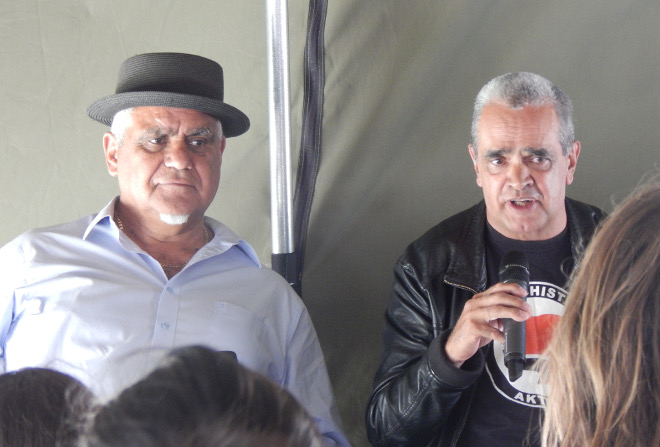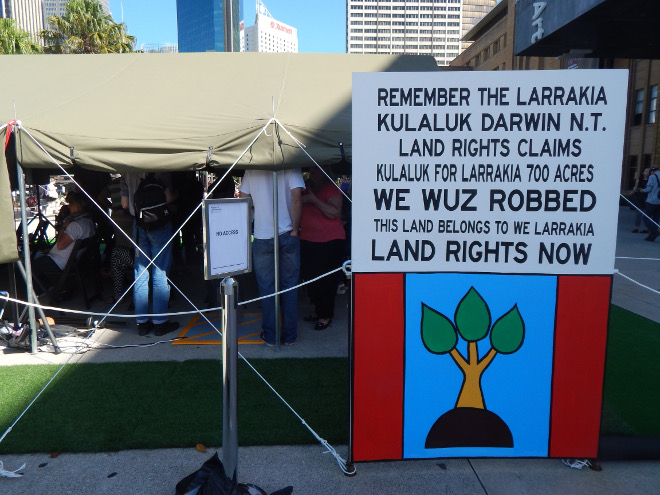Aboriginal Activist Gary Foley Made Things Awkward For Mike Baird’s Government At The Sydney Biennale
"Forget the referendum, it's a diversionary tactic... Until we have land rights, we've got FUCK ALL."

With hundreds of artworks spread over the city’s major galleries (and, bizarrely, a spooky secluded island where Wolverine was filmed), the Sydney Biennale is this year organised into thematic ‘Embassies of Thought’. The Embassy of Spirits at the Art Gallery of NSW features work with a philosophical bent. The Embassy of Disappearance at Carriageworks last week featured renowned performance artist Mike Parr lighting all his work on fire. And, outside the Embassy of Translation at the Museum of Contemporary Art, there’s an installation simply titled Embassy.

Speaking of the work on Saturday, Aboriginal artist Richard Bell described it as a “tribute and homage to the first tent embassy” — the political demonstration first erected in Canberra on Australia Day in 1972. “I consider the tent embassy to be one of Australia’s greatest ever performance artworks,” he told a small crowd under an iconic green tarp. “What’s very much overlooked in this is the intellectual aspect; the symbolism associated with it, the performative aspect.”
“This installation, which Richard has now had in New York, Amsterdam, Venice, Adelaide and a bunch of other places — I love this art project of his,” activist and academic Gary Foley told the crowd. “I see it as a brilliant continuation of what the Aboriginal embassy was all about.”
Then, giving truth to his words, he delivered an hour-long monologue laying into white Australians’ treatment of Aboriginal people and the way the “bastard” politicians — kind of like those supporting the festival — continue to fail Indigenous people today.
–
“WE ARE FUCKED”: An Afternoon With Gary Foley
“Everything that’s happened since the Aboriginal Embassy has undermined it,” Foley says, gesticulating to the group of 40 or so next to Sydney’s pristine harbour at Circular Quay. A busker is singing an Elvis tune nearby and a British contortionist is collecting around 100 onlookers before her show. “Pauline Hanson and John Howard gave all the racists permission to be racists again and there’s no way you’re going to get enough of a ‘yes’ vote to pass a referendum question that has anything to do with Aboriginals ever again. Well, at this period in Australian history anyway.”
His views aren’t exactly optimistic but, after listening to him for awhile, it’s clear they have no real reason to be.
Foley, a Gumbainggir man now living in Melbourne’s Kulin nation, was one of the original founders of the tent embassy in 1972 and now works as a writer, filmmaker, and professor at Victoria University. With this wealth of knowledge, he takes aim at Indigenous incarceration rates and “the inherent racism of the Australian criminal justice system”, and life expectancy rates that have “Aboriginals dying nearly 20 years earlier than non-Aboriginal people”.

But, more than anything, Foley deplores what he sees as increasing trend in lip service to Indigenous culture while the real problems go ignored — a fact that he says is becoming especially pertinent with increasing talks of constitutional recognition from Australian politicians.
“Forget the referendum, it’s a diversionary tactic,” he says. “It’s designed to divert people’s attention from the real issues that confront both white and black Australians today.” An onlooking Aboriginal woman yells “YES” and nods her head so much it looks like she’s bowing.
Foley then similarly knocks down the idea of native title, arguing the only real solution is actual land rights and the Indigenous self-determination that they bring.
“If you have native title you don’t own a damn thing. It’s one of the greatest frauds perpetrated in Australian history. [We need] land rights to enable Aboriginal communities to begin to build towards some level of economic self-sufficiency. Economic independence is the key to political independence. We need to decide what we do, who we are, what our future is. That’s what it’s all about and until we get genuine self-determination, WE ARE FUCKED.”
“If I was the native title owner of this spot here, I own nothing,” he says, gesturing to what is no doubt some of the most expensive real estate in the country. “Does it mean that I could keep this tent up permanently and live here? No, it doesn’t. Does it mean, that I can demand the MCA pay me rent for their ugly building on my native land? No, it doesn’t. Native title is completely meaningless. But a vast majority of Australians believe, if they’ve got native title, they’ve got something. They’ve got FUCK ALL.”

“The only thing you get if you’re a traditional owner is you’re entitled to be patted on the head in a condescending way and wheeled in here so the Lord Mayor of Sydney can ask you to welcome their distinguished guests to your native title area,” he continues. “Poor innocent, gullible native title holders then say ‘I’d like to welcome you to my land’. IT’S NOT YOUR LAND. You don’t own it. You’re a nobody in the white man’s eyes. They’re just wheeling you in to make themselves feel good, then they’ll wheel you out and forget all about you while they have their little party.
“At the end of the day it’s really up to Aboriginal groups around Australia to decide what they see as the best way forward,” Foley says towards the end of the talk. “There is no universal single solution; there’s such diversity in Aboriginal Australia.”
He did, however offer a way to express some of this frustration. “Don’t vote for the Liberals or Labor, vote for someone else,” he says. “Or, better still, do what I do: don’t vote. By voting, you only encourage the bastards. I’ll happily pay the money rather than participate in the fraud and the farce that is the so-called democracy in Australia. How’s that folks?”
Everyone cheers.
–
The State Government Has Other Ideas
This comes two days after NSW Premier Mike Baird gave passionate remarks about Indigenous reconciliation at the Vivid Sydney program launch — the other major state-funded event in Sydney’s current cultural calendar. Beneath bright lights in a small event space inside the MCA — about 30 metres from where Embassy was to be erected — Baird gave a detailed acknowledgement of country.
“Politicians from all sides of politics have come together for reconciliation,” he said, stating he’d had a productive meeting about constitutional recognition the night before. “It’s a very important start to the recognition of our Aboriginals and communities within our constitution. It’s long overdue and something we’re pursuing very strongly.”

Stuart Ayres, the state’s Minister for Trade, Tourism and Major Events, then echoed this in his own address. “I too want to recognise our traditional owners of the land on which we meet today, and say, with a strong degree of passion, that we need to move beyond just recognising Indigenous Australians at events like this. [We need to] make sure they are appropriately recognised in the Australian constitution.”
Generally speaking, it’s interesting to see where the divides fall on political issues like this between Australian artists and those giving them funding. Sydney Biennale is more aware of this than anyone — their last festival faced mass protests and boycotts from artists after receiving funding from Transfield (now Broadspectrum), one of the contractors that run detention centres on Nauru.
Whatever your views are on the Australian creative industry’s reliance on corporate or government funding and the potential moral complexities therein, it’s nice to see such passionate free expression being supported (albeit implicitly) by the festival itself. At the end of Gary Foley’s talk at the Biennale’s opening weekend — one of the banner events for the NSW tourism sector — he suggested everyone move to Melbourne.
“If you want to live in a genuinely not-racist city, move to Melbourne folks,” he said with a grin. “It’s the last outpost of civilisation in Australia.”
–
Embassy will be back outside Sydney’s MCA from May 13-15 with an all-new roster of Indigenous speakers telling the government to shove it.

